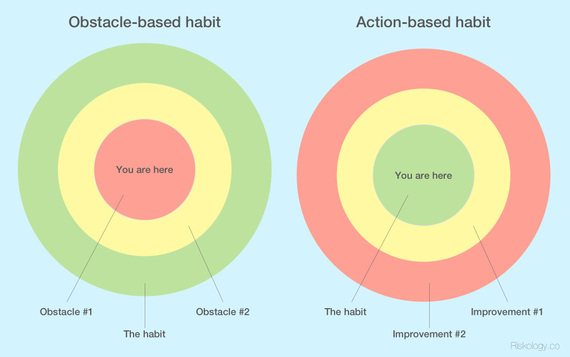This article was originally published on riskology.co.
"We are what we repeatedly do. Excellence, then, is not an act, but a habit." -- Aristotle
A few days ago, I was entering the miles I ran last week into my tracking sheet (I'm a nerd like that). I looked at the total distance for the year so far and realized my shoes were in dire need of replacement. "So that's why my feet are getting so torn up and my joints have been sore," I muttered.
When my wife overhead, she offered to ask a friend for a pass to the Nike employee store; living in Portland and having friends that work at Nike HQ we have easy access to big discounts on the best new gear. We could get a pass in the next week or two.
I thought about it for a second, and then I went online and immediately bought a pair of running shoes at full price and even paid a little more for faster shipping.
Why on Earth did I do that?
One reason is I planned my shoe replacement poorly (doh!). But the more important reason is, after seven years of success, I know exactly how to make myself stick to my running habit and, in this case, it meant getting a new pair of shoes on my feet as quickly as possible, regardless the cost.
Instead of going for savings -- something that's also important to me -- I chose minimal down time instead. I was optimizing for repetition.
If you've ever struggled making a new habit stick, this way of thinking could make a big difference in your success.
The #1 Reason We Fail At New Habits
By definition, the only way to succeed in building a habit is to do it over and over. Repetition builds familiarity and familiarity grows into automation -- a habit. [1] It's a simple concept, so why is it so hard? Where do we go wrong when we fail?
Assuming you've picked a habit you actually care about, the culprit is in how you optimize your efforts to succeed.
When you start a new habit, it feels like there are many things you need to do -- so many steps before you can even get started. Take exercise for example. If you've never made that a part of your life before, here's a list of things you might think you need to do just to get started:
- Find a gym
- Make an exercise plan
- Buy workout clothes
- Start exercising
See the problem? There are three obstacles in front of the thing you actually want to do. Successful habits are built on momentum, and now you have three opportunities to fail in front of your one opportunity to succeed. I'm not great at math, but this is not an equation that equals "winning."
So, what to do instead? Eliminate those obstacles and get started, in the simplest way possible, doing the thing that matters.
To Build A New Habit, Focus On Repetition And Momentum
Back to my shoe dilemma. Do I wait two weeks and save $50 on my new running shoes or pay $100 to keep going right now?
I chose to pay more. Not because I like spending money but because optimizing my healthy habit around money would not make me successful in the long run. Waiting for a great deal would mean potentially missing six runs. In the grand scheme of things, that's not a big deal -- I've been at this for seven years. But it sets a dangerous precedent.
I'm successful with my running habit (and wildly unsuccessful with others) because I've decided that the only thing that will stop me from getting my runs in (repetition) and improving my streak (momentum) is illness. Not waiting to get a good deal on running gear. Not feeling too busy. Not bad weather. None of these potential failure points are a part of the habit-maintenance process for me. If I'm alive and feeling at least reasonably well, I'm running on a pre-determined schedule.
There are a few things, though, you can do to better support yourself and make sure you get your reps in and build momentum.
- Eliminate real obstacles at any cost. If there really is something legitimate standing in the way of getting your reps in and you can pay to fix it, pay for it!
The focus in this article has been on exercise -- it's an easy, tangible example -- but the strategy of optimizing for repetition works on every habit because every habit grows from repeating it over and over.
- Want the habit of working on your business? Stop focusing your time on reading about business strategies and start actually experimenting with them.
When building a habit is important, optimize for what will actually make you successful -- repetition and momentum. In my case, sticking to my running schedule at any cost will make me successful, not saving money on shoes.
What's the critical action you need to do more often to build the habit that's important to you?
Tyler Tervooren founded Riskology.co, where he shares research and insights about mastering your psychology by taking smarter risks. For more, join his Smart Riskologist Newsletter.
Footnotes:
